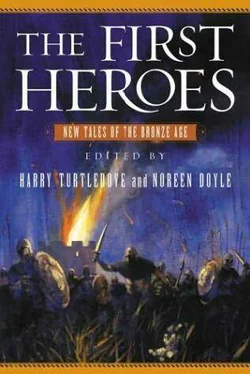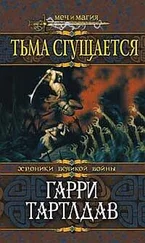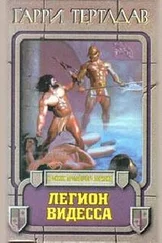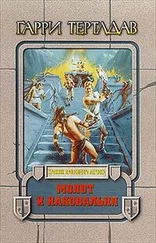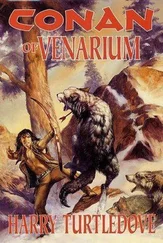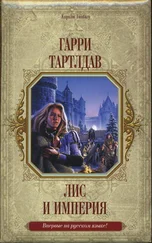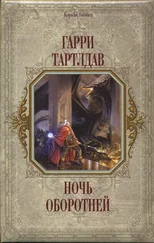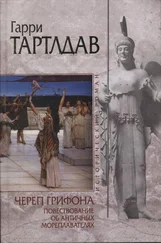Гарри Тертлдав - The First Heroes
Здесь есть возможность читать онлайн «Гарри Тертлдав - The First Heroes» весь текст электронной книги совершенно бесплатно (целиком полную версию без сокращений). В некоторых случаях можно слушать аудио, скачать через торрент в формате fb2 и присутствует краткое содержание. Жанр: Фантастика и фэнтези, на английском языке. Описание произведения, (предисловие) а так же отзывы посетителей доступны на портале библиотеки ЛибКат.
- Название:The First Heroes
- Автор:
- Жанр:
- Год:неизвестен
- ISBN:нет данных
- Рейтинг книги:3 / 5. Голосов: 1
-
Избранное:Добавить в избранное
- Отзывы:
-
Ваша оценка:
- 60
- 1
- 2
- 3
- 4
- 5
The First Heroes: краткое содержание, описание и аннотация
Предлагаем к чтению аннотацию, описание, краткое содержание или предисловие (зависит от того, что написал сам автор книги «The First Heroes»). Если вы не нашли необходимую информацию о книге — напишите в комментариях, мы постараемся отыскать её.
The First Heroes — читать онлайн бесплатно полную книгу (весь текст) целиком
Ниже представлен текст книги, разбитый по страницам. Система сохранения места последней прочитанной страницы, позволяет с удобством читать онлайн бесплатно книгу «The First Heroes», без необходимости каждый раз заново искать на чём Вы остановились. Поставьте закладку, и сможете в любой момент перейти на страницу, на которой закончили чтение.
Интервал:
Закладка:
And worst of all, the tea leaves all refused
To form a pattern readers could have used.
And so Aegina suffered under doubt
As well as spotted fever. Amid the death
And raw despair, a couple souls were stout
And tended invalids to their last breath;
But others, I report to my regret,
Were drunken, rowdy, riotous, and rude—
In short, a bacchanalic rout ensued.
The harbor, drunk with sailors, caught the mood,
And soon from there the tide of riot spilled
To sweep depopulated streets in flood
Until the city plain was all but filled,
A violent lake—except where good sense stilled
The fires round two places, islanding
Plague houses and the palace of the king.
King Aeacus was long since past his prime
And, not as strong as once, in youth, he'd felt,
He couldn't stop the carnival of crime.
His sons? Off heroing with club and pelt
And so no help with troubles he'd been dealt.
They're only known today for being hid
In family trees, and not for what they did—
For hero means "he scatters wide his oats,"
And heroes' brats are strewn across the nations,
Like jetsam tossed from overloaded boats.
Son Tenon apprenticed that vocation
With the greatest of the generations:
No l esser man than he—a drum roll please—
The man, the myth, the legend—Heracles.
Soon after Telamon had helped the Here
To conquer Troy, he spawned the Ajax who
Would later try to replicate that work.
Young Peleus sacked as well a town or two
Before he gave a fateful goddess woo;
His son Achilles had his song of rage
That still is read in this descendent age.
Thus, sonless, Aeacus was forced to handle
The crisis, and he too old to wield a sword—
Which added to his shame, for the scandal
Of crumbling state will always hurt a lord,
Since he is judged by his domain's accord.
And so, as when mere anarchy is loose,
He did what monarchs do, and prayed to Zeus.
During a lull, he climbed the island's peak
Alone (though leaning on the shoulder of
His—valet of the chamber), there to seek
The god's will in his place—for there above
Aphaea's temple is a sacred grove.
He tottered in and settled in the shade,
Then after catching breath, he slowly prayed:
"Dear father—so my mother says you are,
And I think well enough of Mom that I
As king renamed this island after her—
Help us or the city soon will die:
What plague has left, the riots have made fly.
We ask in whatever name you wish we use,
Help us—the city dies if you refuse."
The sun beat down. Summer's cicadas chirred.
Some ants marched up a tree. A gecko found
A hidden moth. At last the old king stirred
And from an empty sky, with dreadful sound
A bolt of lightning struck and fire crowned
The Thunderer's most sacred oak—a sign
Unerring of assistance that's divine.
The crack set Aeacus's head to ringing.
"Give me—" he started, feeling full of awe,
"Give me—" he thought he heard the acorns singing,
"Give me—" alas! slow thinking was his flaw,
"Give me—" he took the first thing that he saw,
"As many citizens, replacement folk
For losses, as the ants upon this oak."
Leaves whispered to a wind not there, then stilled.
The king correctly heard that message too,
And toddled home, secure that Zeus had willed
His realm reborn, his populace renewed.
He was so heartened, he decided to
Go past the citadel down to the city,
Nod, smile, clasp hands, be seen, and do the pretty.
For being seen at being king is, more
Than judgments, generaling, or golden throne,
The greater part of kingship. Even for
The weak, an order makes a leader known.
A word stopped refugees from leaving town:
"It all will turn out right now," he assured.
The sailors looked askance, but none demurred.
To fully play the part, back at the castle
He ordered up a feast in celebration.
The palace cheered—except, it was a hassle
For servants, fixing quickly the collation.
That night, the castle's total occupation
Was fun, both eating hard and drinking deep,
Which led to—not more riots—heavy sleep.
In deepest night, the hour of Hecate,
The quiet of the world rolled out before
The city and the stars. The king's oak tree
Shook branches like maids stretching after chores.
Ants fell to ground, and got up ants no more:
They lost two limbs, stood upright straight and strong,
A formic horde become a human throng.
When Dawn rose from her lover's bed to light
The east, 'twas well before the better folk,
But after early servants. To their fright,
The mountain side was moving—was it smoke?
No, it's descending, like a falling cloak.
The growing light revealed to servile classes
A ragged stream of strapping naked lasses.
For myrmidian workers—soldiers, too—
Are female; they're the only ones who swarm,
While hustling for the food they bring back to
The queen and drones in their below-ground dorms.
'Twas these upon the oak who were transformed,
And those who change partake of prior nature
For what you were before will shape your fate here.
The past is—not the present—present in us;
We aren't slaves to it, but as we grow
We have its habits and, as mirrors twin us,
It gives us shadow selves we cannot disavow:
What we have done informs what we are now—
But if I keep digressing from my topic
My story line will end up microscopic.
The servants, startled, finally woke the guards;
A guard, the king: "Your majesty, come see!"
He came, he saw, he rubbed his eyelids hard,
And mumbled, "What the ---------!" (I am not free
To print the word). But then, with gravity,
The king went out to greet what for the nonce
We'll call "ant girls"—in Greek, the myrmidons.
He met, midst smoking ruins by the wall,
This unclothed cohort causing a sensation
And hailed them, thanking Zeus for, most of all,
His answered prayer—this in explanation
Of what was going on to the staring nation.
It worked, for just a few men hit upon
These women—who ignored them and walked on.
This shrug-off irked the men, who started grousing,
But then a charred beam shifted in the dust,
Reminding people soon they'd need more housing—
Although new clothing also was a must.
Before ancestral voices had discussed
The tasks, the women from the ant collective
Just dusted off their hands, and turned effective.
Burials first. They learned that, during the clashes,
The plague had burned itself out, once refused
New fuel, on quarantined survivor ashes.
The obvious conclusion from the clues:
The cure'd been carried by the girls from Zeus.
Their epidemiology was slight,
But their theology may well be right.
The girls received the kingdom's reverence
With calm good grace, then started reconstruction.
Some city men with vast experience
Tried giving all these newborns some instruction,
But ants and building need no introduction;
Relations with the townsmen turned uneasy,
For all that they were Greeks and civilise.
Continued nakedness too caused a snit—
While some, the outside workers, took to clothing,
The others, never having needed it
Before, rejected its constraint with loathing—
And there is, for a hide-bound elder, no thing
That signals civic ill-health like the crudity
Of unselfconscious public nudity.
Читать дальшеИнтервал:
Закладка:
Похожие книги на «The First Heroes»
Представляем Вашему вниманию похожие книги на «The First Heroes» списком для выбора. Мы отобрали схожую по названию и смыслу литературу в надежде предоставить читателям больше вариантов отыскать новые, интересные, ещё непрочитанные произведения.
Обсуждение, отзывы о книге «The First Heroes» и просто собственные мнения читателей. Оставьте ваши комментарии, напишите, что Вы думаете о произведении, его смысле или главных героях. Укажите что конкретно понравилось, а что нет, и почему Вы так считаете.
